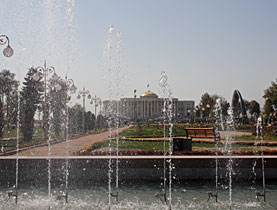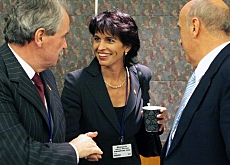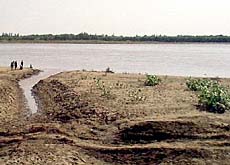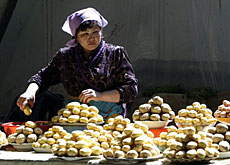Swiss-aided Tajikistan stands at a crossroads

Switzerland has for years been helping the Central Asian state of Tajikistan on its way to liberalisation and democracy. But it is no easy task.
Corruption and a fragile political situation are posing problems not only for Swiss aid but also for many national and international development organisations in the capital, Dushanbe.
The boulevards of Dushanbe are shaded by sycamore, poplar and maple trees. All around are Soviet buildings, monuments of Tajik heroes, lush herbaceous borders and large fountains.
Posters featuring the country’s leader, President Imamali Rakhmonov, look down on the life of the city.
There is very little traffic. In between the second-hand cars from the west and old Russian models, there are two kinds of new vehicles that stand out – small white minibuses and large jeeps.
The minibuses are imported from China, which along with Russia, Kazakstan and Iran is one of the largest creditors and investors in Tajikistan. The money goes towards mainly building new roads and tunnels.
These days, convoys of trucks full of Chinese products cross the Pamir mountain range into the country, having taken the place of the caravans of the past.
The jeeps belong to the 70 or so development organisations that have their headquarters in the Tajik capital, including the Swiss Cooperation Office of the State Secretariat for Economic Affairs (Seco) and the SDC.
The international organisations in Dushanbe have become an important employer for well-educated Tajik nationals.
Foreign presence
Until a few years ago, Switzerland was one of the largest European donor countries in the country.
However, in recent times and as a result of the war in neighbouring Afghanistan, Germany and Britain have stepped up their presence massively. The French have a military base there and the United States is also present.
Tajikistan has neither oil nor gas, yet it lies in a geopolitically strategic position in resource-rich Central Asia. It has water and is the largest water reservoir in the region. Hydro energy is to be enormously developed in the coming years.
Switzerland also has interests. Tajikistan has since 1993 belonged to the Swiss voting group in the Bretton Woods institutions. Thanks to this group, which also includes Poland, Serbia, Azerbaijan. Kyrgyzstan, Turkmenistan and Uzbekistan, “small” Switzerland can help steer the course of the International Monetary Fund and the World Bank.
Rudolf Schoch, head of the Swiss Cooperation Office in Tajikistan, sees a more important reason. “Switzerland has a vital interest in stabilising the region. If a conflict breaks out in Central Asia, we are directly affected by the global consequences.”
Fragile peace
“Peace in Tajikistan is fragile,” comments a Tajik political expert who does not wish to be named. The former Soviet republic gained independence in 1991.
Shortly afterwards, the country plunged into a terrible civil war (1992-1997) between government troops and opposition forces, mainly Islamic groups. Far from the gaze of the media there were massacres and mass graves.
Independence also brought a drastic decline in living standards as subsidies from Moscow had accounted for about 80 per cent of household budgets. Last winter, which was particularly cold and long, confidence in the government was seriously undermined.
A fair number of regions had no electricity or heating for several months.
“The government has not succeeded in providing people with the most elementary basics and that’s why they are extremely frustrated. The bad economic situation is leading to increasing social tensions,” the expert said. “External influences can quickly endanger stability.”
“The government says we are independent but people are going hungry,” says a young Tajik woman who works for a development organisation and also wishes to remain anonymous. She adds that the government looks after itself. It is extremely corrupt, with key positions in the economy occupied by family members.
Corruption
The economically strategic aluminium works near Dushanbe are directly under the president’s leadership.
The president’s brother-in-law is the owner of the country’s largest bank (Orien Bank) and the largest cotton trader. One daughter has the licence for Mobile Lines of Tajikistan and the other is head of consular services and set to become the first ambassador to Switzerland.
Can you operate in a corrupt system without being a party to it? “We have close cooperation with the government but the money for the time being stays with us,” says Schoch, who attaches much importance to political dialogue.
Seco also works with the finance ministry to analyse the system’s current weak points. People have been trained and an audit institution set up to improve government leadership. The Swiss Cooperation Office in addition promotes various projects to help the grassroots democracy process.
According to Seco, countries that are a development priority for Switzerland have to show a willingness to reform and the appropriate track record. From the outside it does not appear that these criteria have been met.
“In some areas we were terribly disappointed. In economic liberalisation we had hoped that key sectors like aluminium production would be used much more to finance the economic development of the country,” Schoch says.
The IMF accused Tajikistan at the end of 2007 of having misused a large part of state reserves for private credits, mainly in the cotton industry. There were also strong accusations of corruption levelled against various state companies.
“The country is at a crossroads. If the government does not make the appropriate reforms, there could in an extreme case be a slide backwards into conflict.”
swissinfo, Corinne Buchser in Dushanbe
Tajikistan lies in Central Asia between Kyrgyzstan, Afghanistan, Uzbekistan and China.
It is one of the world’s poorest countries.
Area: 143,100 sq km
Major languages: Tajik, Uzbek, Russian
Major religion: Islam
Capital: Dushanbe
Population: 6.7 million
Exports: Aluminium, electricity, cotton, fruit and textiles.
Annual GDP per capita: $390
In 2007 the commitment of the Swiss Agency for Development and Cooperation (SDC) in Tajikistan, Kyrgyzstan and Uzbekistan amounted to some SFr22 million ($19 million), SFr12 million of which was allocated to Tajikistan.
Five areas of intervention were chosen for Swiss assistance in Tajikistan – health care reform, basic infrastructure, disaster risk and water management, private sector development and public institutions and services.
The Swiss coordination office in Dushanbe employs 35 people.
Trade between Switzerland and Tajikistan is minimal, despite Swiss firms being highly active in the cotton sector.

In compliance with the JTI standards
More: SWI swissinfo.ch certified by the Journalism Trust Initiative



You can find an overview of ongoing debates with our journalists here . Please join us!
If you want to start a conversation about a topic raised in this article or want to report factual errors, email us at english@swissinfo.ch.